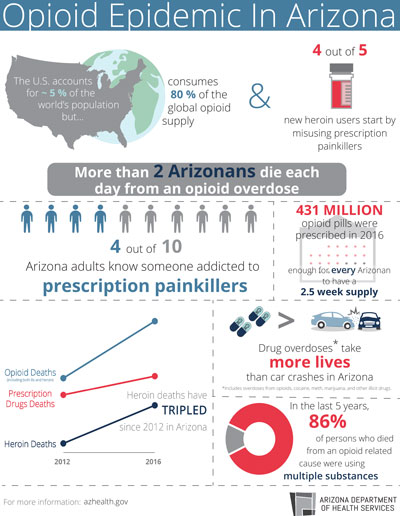 Earlier this week, Governor Doug Ducey issued a public health emergency declaration that calls for a statewide effort to put an end to opioid deaths in Arizona. The Governor declared the need for immediate action as the number of opioid overdoses and deaths increase at an alarming rate. Last week, we released the 2016 Opioid Report and the numbers are alarming. The data shows an average of more than two people per day are losing their lives to these highly addictive drugs.
Earlier this week, Governor Doug Ducey issued a public health emergency declaration that calls for a statewide effort to put an end to opioid deaths in Arizona. The Governor declared the need for immediate action as the number of opioid overdoses and deaths increase at an alarming rate. Last week, we released the 2016 Opioid Report and the numbers are alarming. The data shows an average of more than two people per day are losing their lives to these highly addictive drugs.
We know that most people using prescription opioids for pain understand the deadly potential of opioids and never intend to become addicted. But the alarming trends cannot be denied, and an urgent call to action is imperative. Better, safer management of chronic pain is an important piece of a comprehensive approach to reducing opioid deaths as well as improving quality of life for Arizonans suffering from chronic pain.
Last week ADHS convened a gathering of leaders and experts in the first Chronic Pain Summit to begin work on development of a public health program for chronic pain. Participants developed a deeper understanding of the complexities of chronic pain, learned more about how to effectively manage chronic pain through a range of proven non-opioid practices, and began drafting recommendations to move forward collectively as a state.
Chronic Pain Summit participants looked at several aspects of chronic pain, including its emerging presence as a major public health problem, the history and evolution of chronic pain assessment and treatment; the neurobiology of pain and addiction; the interplay of chronic pain and mental health; its impact on the workforce; and an in-depth look at evidence-based practices and self-management strategies that do not rely on prescription medications.
As an initial launch into a plan of action, participants engaged in facilitated discussions and made priority recommendations across four strategic arenas:
- Identifying Barriers and Solutions to Widespread Utilization of Effective Therapies
- Developing Systems of Care for Improving Access to Treatment
- Suggesting Outcome Measures for Chronic Pain on a Public Health Scale
- Developing Effective Public Health Messaging on Chronic Pain
We will identify and implement further efforts to educate both healthcare professionals and the public on effective chronic pain management. We have also started the process of convening stakeholders on a statewide basis. We are committed to letting every Arizonan know that, while we may not expect to always be 100 percent pain-free, there are safe, effective ways to manage our pain and have a good quality of life.









